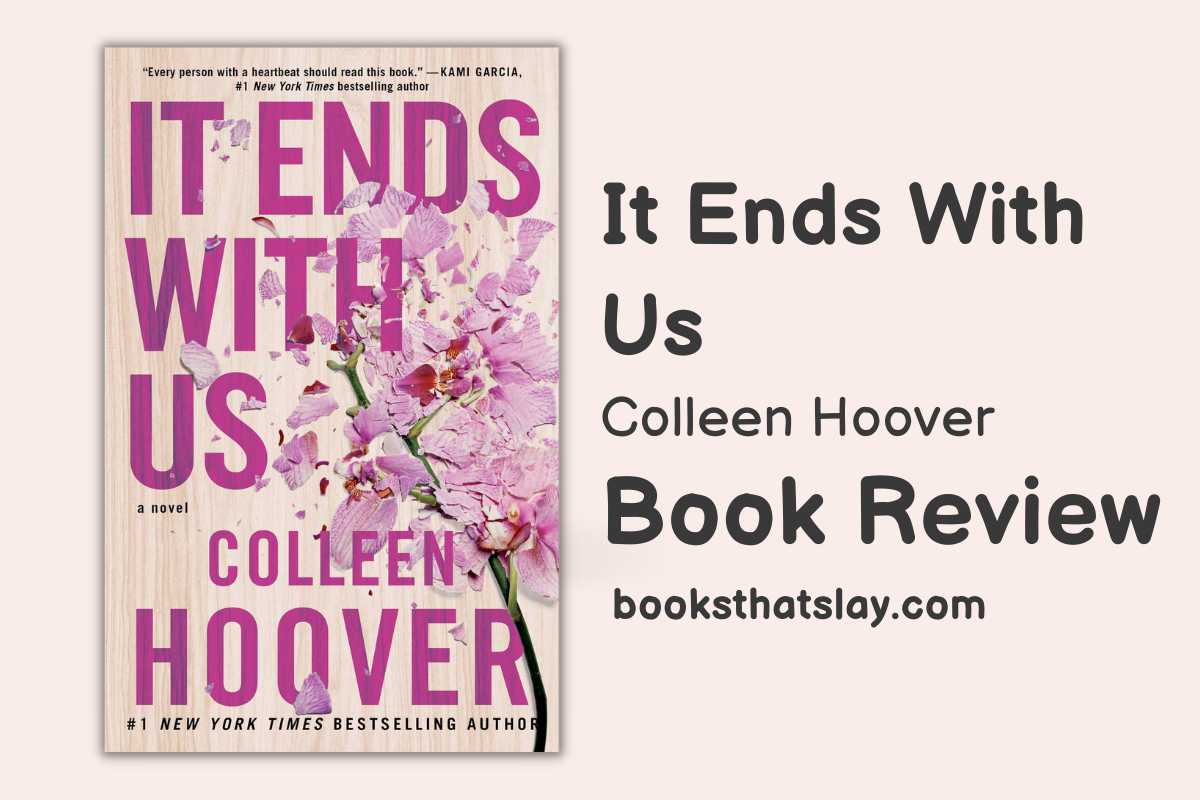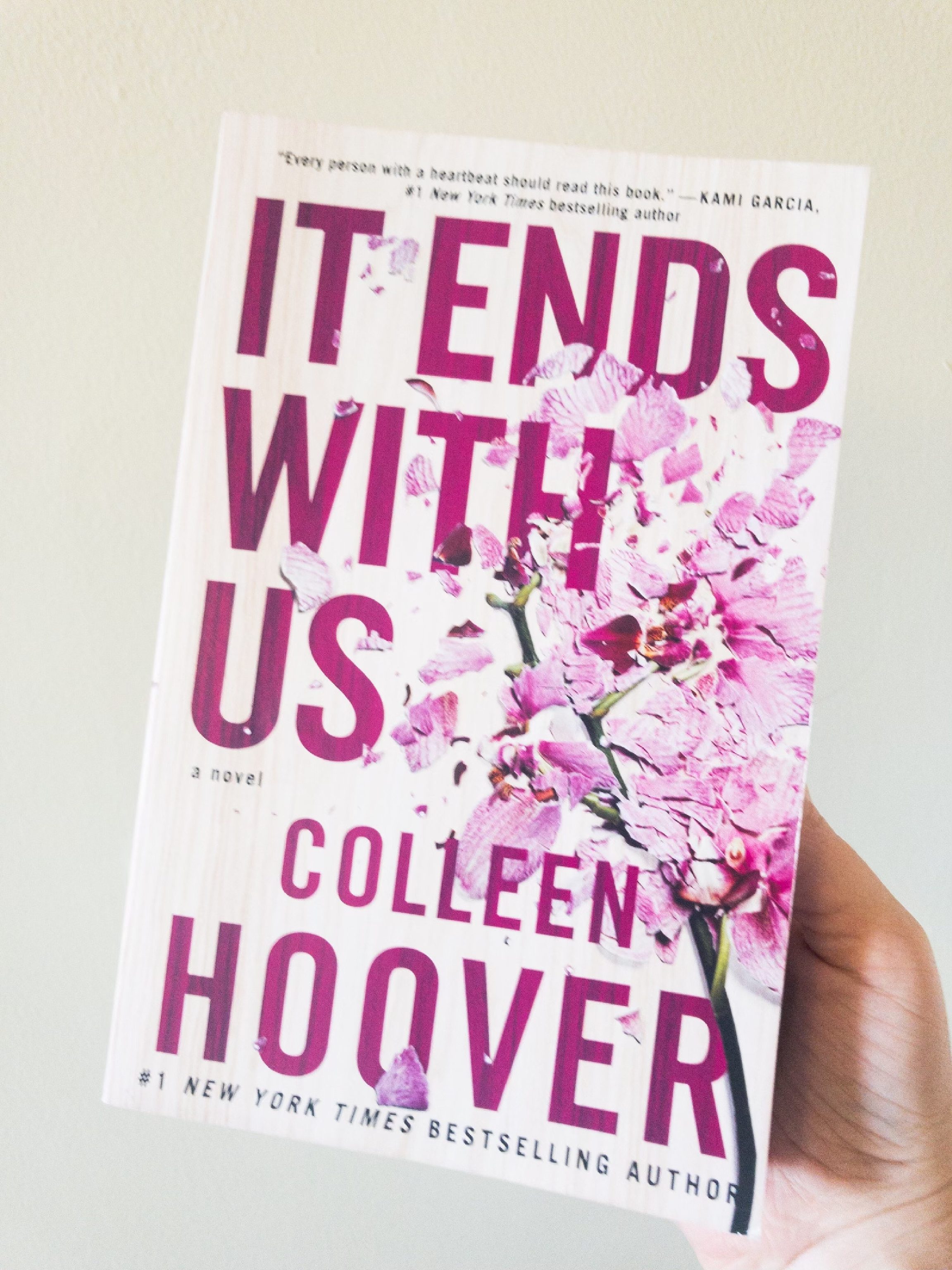Exploring the Critical Reception of Colleen Hoover’s "It Ends With Us": A Deep Dive into Reviews and Scholarly Discourse
Related Articles: Exploring the Critical Reception of Colleen Hoover’s "It Ends With Us": A Deep Dive into Reviews and Scholarly Discourse
Introduction
With great pleasure, we will explore the intriguing topic related to Exploring the Critical Reception of Colleen Hoover’s "It Ends With Us": A Deep Dive into Reviews and Scholarly Discourse. Let’s weave interesting information and offer fresh perspectives to the readers.
Table of Content
- 1 Related Articles: Exploring the Critical Reception of Colleen Hoover’s "It Ends With Us": A Deep Dive into Reviews and Scholarly Discourse
- 2 Introduction
- 3 Exploring the Critical Reception of Colleen Hoover’s "It Ends With Us": A Deep Dive into Reviews and Scholarly Discourse
- 3.1 It Ends With Us Book Review Google Scholar: A Journey Through Academic Perspectives
- 3.2 It Ends With Us Book Review Google Scholar: Related Searches
- 3.3 It Ends With Us Book Review Google Scholar: FAQs
- 3.4 It Ends With Us Book Review Google Scholar: Tips for Further Exploration
- 3.5 It Ends With Us Book Review Google Scholar: Conclusion
- 4 Closure
Exploring the Critical Reception of Colleen Hoover’s "It Ends With Us": A Deep Dive into Reviews and Scholarly Discourse

Colleen Hoover’s "It Ends With Us" has captured the hearts of millions, becoming a contemporary romance phenomenon. The novel, exploring themes of love, abuse, and healing, has sparked numerous discussions and debates, especially within the realm of literary criticism. While the book’s popularity is undeniable, its critical reception has been more nuanced, prompting a deeper examination of its literary merit and societal impact. This exploration delves into the scholarly discourse surrounding "It Ends With Us," analyzing its themes, strengths, and weaknesses, and examining the broader implications of its reception.
It Ends With Us Book Review Google Scholar: A Journey Through Academic Perspectives
The phrase It Ends With Us Book Review Google Scholar serves as a gateway to understanding the book’s reception within academic circles. Google Scholar, a comprehensive platform for scholarly research, provides access to a wealth of information, including peer-reviewed articles, dissertations, and book reviews.
While "It Ends With Us" might not be the subject of extensive academic analysis compared to classic literary works, several scholarly resources offer valuable insights into its impact and thematic significance. These resources can be categorized into several key areas:
1. Analysis of Domestic Violence and Abuse:
A significant portion of the scholarly discourse surrounding "It Ends With Us" focuses on its portrayal of domestic violence and abuse. Scholars analyze the novel’s depiction of coercive control, the emotional and psychological manipulation used by abusers, and the complexities of escaping abusive relationships.
2. Exploration of Trauma and Healing:
The novel’s exploration of trauma and healing, particularly in the context of abuse, has also attracted scholarly attention. Researchers examine how the protagonist, Lily, navigates the aftermath of trauma, the challenges of seeking help, and the journey toward self-discovery and empowerment.
3. Examination of Romantic Relationships:
"It Ends With Us" provides a platform for analyzing the dynamics of romantic relationships, particularly in the context of love, trust, and vulnerability. Scholars explore the novel’s portrayal of healthy and unhealthy relationships, highlighting the importance of communication, boundaries, and emotional maturity.
4. Discussion of Literary Style and Technique:
While the novel’s plot and themes dominate scholarly discussions, some researchers also delve into its literary style and techniques. They analyze Hoover’s use of character development, narrative structure, and stylistic devices to create an engaging and emotionally resonant reading experience.
5. Exploration of Societal Impact and Cultural Relevance:
The novel’s immense popularity has sparked discussions about its societal impact and cultural relevance. Scholars examine how "It Ends With Us" has contributed to conversations surrounding domestic violence, mental health, and the complexities of romantic relationships.
6. Examination of the "New Adult" Genre:
"It Ends With Us" falls under the "New Adult" genre, a category of fiction targeting young adults navigating the transition to adulthood. Scholars analyze the genre’s tropes, themes, and appeal, considering how "It Ends With Us" contributes to the genre’s evolution and impact.
7. Critical Analysis of the Author’s Work:
Scholarly discussions surrounding "It Ends With Us" often extend to examining Colleen Hoover’s broader literary output. Researchers analyze her recurring themes, stylistic choices, and overall contribution to contemporary fiction, placing "It Ends With Us" within the context of her broader body of work.
8. Examination of Reader Reception and Impact:
The novel’s immense popularity has prompted scholarly research into its impact on readers. Researchers examine how the book has resonated with audiences, its influence on personal narratives and perspectives, and its potential to spark dialogue and awareness around sensitive topics.
It Ends With Us Book Review Google Scholar: Related Searches
The phrase It Ends With Us Book Review Google Scholar opens the door to a range of related searches that offer deeper insights into the novel’s reception and its broader context. These searches can be categorized into:
1. Colleen Hoover Research:
- "Colleen Hoover research" or "Colleen Hoover scholarship" leads to scholarly articles and resources focusing on Hoover’s overall literary career, her thematic concerns, and her impact on contemporary fiction.
2. Domestic Violence Literature:
- "Domestic violence literature" or "literature on intimate partner violence" provides a broader context for understanding the portrayal of abuse in "It Ends With Us," connecting the novel to a wider body of literature exploring this complex issue.
3. Trauma and Healing Literature:
- "Trauma and healing literature" or "literature on post-traumatic stress disorder" offers insights into the psychological and emotional processes of healing from trauma, providing a framework for analyzing Lily’s journey in the novel.
4. New Adult Fiction Research:
- "New Adult fiction research" or "New Adult literature analysis" explores the genre’s characteristics, themes, and audience, offering a context for understanding "It Ends With Us" within the broader landscape of New Adult fiction.
5. Reader Response Theory:
- "Reader response theory" or "reception theory" provides a framework for analyzing the impact of "It Ends With Us" on readers, examining how individual readers interpret the novel and its themes.
6. Feminist Literary Criticism:
- "Feminist literary criticism" or "gender studies in literature" offers a lens for analyzing the portrayal of female characters in "It Ends With Us," examining themes of power, agency, and societal expectations.
7. Literary Analysis of Colleen Hoover’s Work:
- "Literary analysis of Colleen Hoover’s work" or "critical analysis of Colleen Hoover’s novels" focuses on specific aspects of Hoover’s writing style, her use of language, and her thematic preoccupations.
8. Book Reviews and Critical Reception:
- "It Ends With Us reviews" or "critical reception of It Ends With Us" leads to a range of reviews, both professional and reader-generated, providing diverse perspectives on the novel’s strengths and weaknesses.
It Ends With Us Book Review Google Scholar: FAQs
1. Is "It Ends With Us" a widely studied book in academia?
While "It Ends With Us" has garnered immense popularity, it might not be as extensively studied in academia as classic literary works. However, the novel’s themes and societal impact have attracted scholarly attention, particularly in fields like literary analysis, feminist studies, and social psychology.
2. What are the main criticisms of "It Ends With Us"?
Some critics argue that the novel’s portrayal of domestic violence is overly simplistic and romanticizes the abuser’s character. Others express concerns about the novel’s focus on romantic relationships and its potential to reinforce traditional gender roles.
3. What are the strengths of "It Ends With Us"?
The novel is praised for its emotional impact, its relatable characters, and its exploration of important social issues. It has been credited with raising awareness about domestic violence and encouraging conversations about mental health.
4. What are some key academic articles or resources on "It Ends With Us"?
While there might not be a plethora of academic articles dedicated solely to "It Ends With Us," several scholarly resources offer insights into its themes and impact. These resources can be found through Google Scholar by searching for phrases like "It Ends With Us domestic violence," "Colleen Hoover feminist analysis," or "New Adult fiction themes."
5. How does "It Ends With Us" contribute to the "New Adult" genre?
"It Ends With Us" exemplifies key tropes of the New Adult genre, focusing on themes of love, loss, and self-discovery as young adults navigate the complexities of adulthood. The novel’s emotional intensity and exploration of personal struggles resonate with the target audience of this genre.
6. What are the implications of "It Ends With Us" for contemporary fiction?
The novel’s immense popularity highlights the growing demand for emotionally driven stories that address contemporary social issues. It has contributed to the rise of the "New Adult" genre and has sparked discussions about the role of fiction in addressing complex themes like domestic violence and mental health.
7. What are the ethical considerations surrounding "It Ends With Us"?
The novel’s portrayal of domestic violence has sparked debates about its ethical implications. Some argue that the novel’s focus on romantic relationships and its romanticized portrayal of the abuser could potentially be harmful to survivors of abuse.
8. How can readers engage with the scholarly discourse surrounding "It Ends With Us"?
Readers can engage with the scholarly discourse surrounding "It Ends With Us" by exploring resources on Google Scholar, reading book reviews and critical essays, and participating in online discussions about the novel. By engaging with different perspectives, readers can gain a deeper understanding of the novel’s themes, its impact, and its place within contemporary literature.
It Ends With Us Book Review Google Scholar: Tips for Further Exploration
1. Utilize Google Scholar Effectively:
- Use precise keywords like "It Ends With Us critical analysis," "Colleen Hoover feminist perspective," or "domestic violence in contemporary fiction" to refine your search results.
- Explore the "Cited by" feature to find articles that have referenced scholarly work on "It Ends With Us."
- Use advanced search operators (e.g., quotation marks for exact phrases) to refine your search further.
2. Explore Diverse Academic Disciplines:
- Look beyond literary studies to explore resources in fields like sociology, psychology, and gender studies to gain a broader understanding of the novel’s themes and societal impact.
- Consider searching for dissertations or thesis projects that focus on "It Ends With Us" or related topics.
3. Engage in Online Discussions:
- Participate in online forums, book clubs, and social media groups dedicated to "It Ends With Us" to engage with other readers and scholars.
- Share your insights and perspectives, and learn from the diverse interpretations of the novel.
4. Connect with Experts:
- Reach out to scholars or researchers specializing in contemporary fiction, domestic violence, or trauma studies to learn more about their perspectives on "It Ends With Us."
- Attend conferences or workshops related to these fields to engage in discussions and learn from experts.
It Ends With Us Book Review Google Scholar: Conclusion
The phrase It Ends With Us Book Review Google Scholar serves as a starting point for understanding the complex and multifaceted critical reception of Colleen Hoover’s popular novel. While the book might not be the subject of extensive academic analysis compared to classic literary works, its themes and societal impact have attracted scholarly attention, particularly in fields like literary analysis, feminist studies, and social psychology.
By exploring scholarly resources, engaging in online discussions, and connecting with experts, readers can gain a deeper understanding of the novel’s strengths, weaknesses, and its broader implications for contemporary literature and society. "It Ends With Us" continues to spark important conversations about love, abuse, healing, and the complexities of human relationships, making it a valuable resource for exploring these issues within the context of literature and contemporary culture.








Closure
Thus, we hope this article has provided valuable insights into Exploring the Critical Reception of Colleen Hoover’s "It Ends With Us": A Deep Dive into Reviews and Scholarly Discourse. We appreciate your attention to our article. See you in our next article!